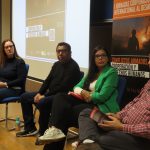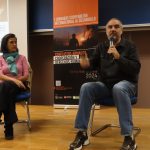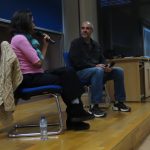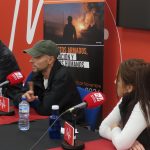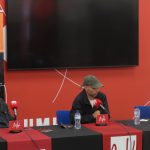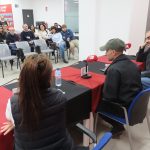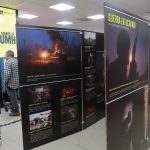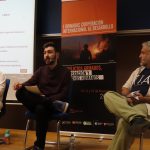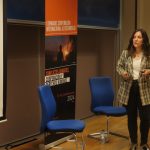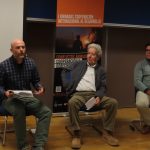Armed Conflicts, Cooperation and Human Rights Conference at UMH concludes with participation by over 250 people
15 November 2024
Over the week of November 11-15, the UMH hosted the inaugural Armed Conflicts, Cooperation and Human Rights Conference, an event that attracted participation by over 250 people.
The event began with a presentation on international journalism. In it, the president of Reporters without Borders in Spain, Alfonso Bauluz, and the beneficiaries of the RSF-UMH Elche Safe Space for Freedom of the Press program, Efren Lemus and Laura Ardila, reflected on the role of journalism today and the difficulties of carrying it out. They also discussed the coexistence between communication professionals with people who can “inform” in a myriad of ways. This introductory intervention had conversation and debate thanks to the participation by students who were present in the Ramón Lobo classroom.
“The people present were able to hear from authoritative voices on how to inform and how to deal with disinformation, as well as the difficulties of maintaining rigor and ethics in an industry that is so economically challenged,” explained Bauluz.
Afterwards, journalist from Eldiario.es, Olga Rodríguez, who is specialized in international information and human rights, told how information is being reported in international conflicts, such as the war in Gaza. She also stressed the importance of using correct language when reporting, especially when it concerns news that are happening far away.
Exhibition by journalist, Pablo Miranzo, on the war in Ukraine
Later, the Plaça de Baix was home to the presentation of the ‘Ukraine in War’ exhibition by photojournalist from Elche and UMH graduate, Pablo Miranzo, where it will remain through November 23. This exhibition reveals the human consequences and technological dimensions of this war, one of the most complex of our times.
“Although there is not so much talk about Ukraine, people continue to die there every day. What’s more, journalism students were able to learn about the difficulties of a freelance journalist who is working in a context such as this one,” added Miranzo.
Throughout his talk, the photojournalist explained what his work there is like, the difficulties of photographing an ongoing war, and the reality of a country that has been suffering the consequences of war for almost three years.
Human rights and geopolitics present in the Ramón Lobo Classroom
The sessions on Thursday began with a presentation by analyst of the media outlet, “Deciphering War,” Alejandro López. He, together with the representative of GECOTEM at the University of Alicante, Samuel Ortiz, focused on the most important geopolitical aspects in today’s world.
Along these lines, López commented that “We have tried to provide a general idea of how the world is organized.” He also added, with respect to “Deciphering War,” that “We talk about everything concerning international politics, regardless of whether the content is well known or not.”
Then it was the turn for representatives of Amnesty International, Carlos Escaño, and another from DELÀS Center, Pere Brunet. They explained the role played by human rights in a “militarized” world. Afterwards, that afternoon, the protagonist was photographer, Roger Grasas, with a presentation of his photobook, “Ubuntu.” The topic his book addresses is Mozambique, and following it, there was a round table on development cooperation with representatives from the Red Cross, Farmamundi, and Medicusmundi.
Elections in the United States to conclude the conference
This event concluded with a conversation led by professor of political communication at Rey Juan Carlos University, Casandra Lopez. In it, she described the results of the most recent presidential elections in the USA. Then, in this event’s final offering, co-director of the IECAH, Jesús Núñez, conversed with the students and spectators in the conference audience.
The lectures in this conference were presented by the Director of the Area of Development Cooperation and Volunteering at the UMH, Juana Aznar, and Councilperson of Cooperation at the Elche City Hall, Celia Lastra. The lectures were moderated by journalism professors, José Luis González-Esteban and Carmen López; journalists, Andrea Aldana, José Antonio Serrano, María Subieta, and Isidre Ambrós. Event organizers included the UMH, Elche City Hall, and the Valencian Coordinator of NGOs, in collaboration with the Ryszard Kapuscinski Seminar on Journalism and Human Rights of the UMH and the Chair of Audiovisual Analysis and Prospective.

